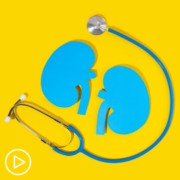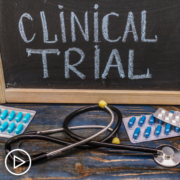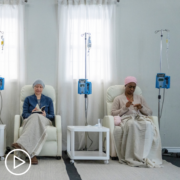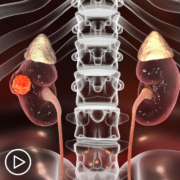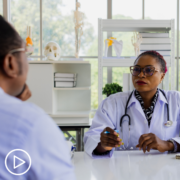PODCAST | Evolving Myelofibrosis Treatment Options: What You Should Know
Myelofibrosis treatment and care is evolving quickly so it’s essential to understand your options and work with your healthcare team when making treatment decisions. In this webinar, Dr. Gaby Hobbs will discusses the latest updates in research and clinical trials, the role of new and emerging myelofibrosis therapies, and shares advice for accessing quality care.
Dr. Gabriela Hobbs is a hematology-oncology physician specializing in the care of patients with myeloproliferative neoplasms (MPN), chronic myeloid leukemia and leukemia. Dr. Hobbs serves as clinical director of the adult leukemia service at Massachusetts General Hospital. Learn more about Dr. Gaby Hobbs.
See More from Evolve Myelofibrosis
Transcript:
Katherine:
Hello and welcome. I’m your host, Katherine Banwell. As patients collaborate on treatment decisions with their healthcare team, it’s important that they understand all of their options and how these options may be impacted by research developments. That’s why the Patient Empowerment Network created the Evolve Series, to arm you with the latest information and to help you feel empowered and confident during conversations about your care.
In today’s program, we’re going to hear from an expert in the field about the evolving treatment landscape for myelofibrosis and discuss how you can play an active role in your care.
Before we get into the discussion, please remember that this program is not a substitute for seeking medical advice. Please refer to your healthcare team about what might be best for you. Well, let’s meet our guest today. Joining us is Dr. Gaby Hobbs. Dr. Hobbs, welcome. Would you please introduce yourself?
Dr. Hobbs:
Hi, how are you? Thank you so much for inviting me today. My name is Gaby Hobbs. I’m the clinical director of the leukemia service at Mass General Hospital in Boston and the director of the MPN program at MGH as well. I conduct clinical trials as well as see patients with myeloproliferative neoplasms.
Katherine:
Thank you so much for taking the time to join us today. We really appreciate it.
Dr. Hobbs:
My pleasure.
Katherine:
Before we get into our discussion, can you share with the audience how the field of myelofibrosis has changed over the course of your career?
Dr. Hobbs:
Yeah, so it really has been a very exciting journey. So, when I was in medical school, I think that we basically had just discovered the JAK2 mutation.
So, in the course of my own training and then my professional career, we’ve gone from myeloproliferative diseases being conditions where we really didn’t necessarily have a reason why people would get these conditions. Now not only do we know about the JAK2 mutation, but we know about many other mutations that patients can have. Then in 2011, the first JAK inhibitor was approved, ruxolitinib (Jakafi), and since then, three additional JAK inhibitors have now been approved, including pacritinib (Vonjo), fedratinib (Inrebic), and most recently, momelotinib (Ojjaara).
So, the field has definitely advanced concretely in that regard. But we also just have much more information about how to diagnose these conditions and also how to treat them. Outside of the JAK inhibitors, we’re better at recognizing when patients need to go to get a bone marrow transplant. For example, and our outcomes with bone marrow transplantation have improved significantly. We also have many other treatment approaches that wouldn’t have existed before, and we also recognize that patients with MPNs live with a lot of symptoms. So, I think that we’re better at just the doctoring part of taking care of patients with MPN. So, definitely, the field has just really, really changed significantly in the last two decades.
Katherine:
That sounds like it’s been a rapid change, really. There may be some confusion, Dr. Hobbs, among people wondering what is the difference between primary and secondary myelofibrosis? Could you describe the differences?
Dr. Hobbs:
Sure. Great question. So, that term, primary and secondary, is actually used in medicine very frequently for the description of many conditions that are not that different. So, primary means a patient has myelofibrosis and did not have any myeloproliferative neoplasm, or MPN, before their diagnosis.
So, they went to the doctor and the first diagnosis they received was a diagnosis of myelofibrosis. Now sometimes we suspect that a patient may have had another MPN previously, such as essential thrombocythemia or polycythemia vera, but they just weren’t diagnosed.
What I mean by that is, you know, let’s say you meet a patient and you look through their chart and you see that five years ago or 10 years ago, they had really, really high platelets or very high red blood cell numbers. So, there you could say, well, you know, you were never diagnosed with ET or PV, but maybe you had that. So, you probably have secondary myelofibrosis, but the diagnosis, you know, that you come with to the doctor is myelofibrosis. So, secondary myelofibrosis means that you had an underlying condition before, meaning you were first diagnosed with one condition like PV, polycythemia vera, or ET, and then those conditions turned into myelofibrosis.
And then we call that secondary myelofibrosis, meaning it is secondary to the primary condition, meaning ET or PV. One area of confusion that I’d like to be able to clarify also related to this is if a person has secondary myelofibrosis, they don’t have two myeloproliferative neoplasms or two conditions. It is one and the same. They just live on a spectrum and over time, they can turn into, one into the other. So, it’s not that you now have two diagnoses, it’s still the same condition, it’s just morphed a little.
Katherine:
Okay, thank you for that explanation. I’d like to talk about the importance of a patient’s healthcare team. What are the benefits to seeking care with a myelofibrosis specialist, even if it’s just for a second opinion or a consultation?
Dr. Hobbs:
Great question. I think that one thing that COVID has given us is the ability to have webinars like this, but also that you can seek second opinions more easily with the advent of telehealth.
So, whereas before I think that getting that second opinion would have been maybe more challenging, perhaps now it’s easier. But to answer your question, these conditions are rare. Myelofibrosis in particular is even more rare than the others.
The landscape, as I kind of alluded to in our initial question, has changed significantly in the last two decades. So, getting a second opinion, whether that’s, like you said, just for an initial consultation, and then you never see that person again. Or you end up having kind of two doctors, one that treats you for your day-to-day needs and an expert or specialist that sees you occasionally as things may change, which can be very beneficial for a variety of reasons. I think that the first one is to just hear hopefully the same information that your initial doctor gave you, but maybe from a different perspective. I think that’s always helpful when dealing with a new diagnosis.
Second is, you know, a specialist may have access to clinical trials. Although that may not be the right thing for you when you first meet them, it may be something you would want to consider or may be appropriate for you later down in your treatment. So, being connected to somebody that has access to research is something that, you know, it opens a door.
Katherine:
We’ve established that research in the field is moving quickly. What are new and emerging therapies that are showing promise?
Dr. Hobbs:
Yeah, so the list is long and it’s getting longer. So, in addition to the fact that we now have four JAK inhibitors approved, which is worth just remembering that, because not that long ago we only had one, and one of them was just approved less than six months ago. There are many new agents that are being studied in combination with the JAK inhibitors. This past year at the American Society of Hematology meeting, which is the annual meeting where we go to share our research and learn from our colleagues, there were two Phase III studies that were presented at the same time.
I can’t remember, or I don’t think, but that has really ever happened before for myelofibrosis. One of them was with an agent called pelabresib, which is a type of molecule called a BET Inhibitor. And the other one was with an agent called navitoclax, which is an agent called a BCLXL-BCL2 inhibitor, which is a molecule that helps cells to undergo apoptosis or programmed cell death.
So, these molecules were both combined with ruxolitinib. And we saw the results of the Phase III studies for each of these agents, and they were really quite exciting. The punchline for both of these studies is that they demonstrated that when you give two drugs as opposed to just one, the amount of patients that have a significant reduction in their spleen is doubled than when you give ruxolitinib in it by itself. So, for some of our patients that is a really meaningful number. You know, if you’re a patient that suffers from a big spleen, knowing that there’s a possibility of having two drugs that you can take to really shrink that spleen in a significant way, I think is very, very promising. On the symptom front, taking two medicines versus one medicine really didn’t seem to make a huge difference. I think we can analyze this in two different ways.
We can see the negative or the positive side of this. So, on the negative side, well, it’s too bad that, you know, added medication didn’t help patients feel better. But on the upside, it’s also good that taking two medicines didn’t make people feel worse. Sometimes you can think of, you know, if you’re taking more medication, maybe you will feel worse. So, the jury is kind of still add on the significance of those results. But regardless, without getting into too much detail about these studies, I think it’s really exciting for myelofibrosis patients to know that there are two agents that are in Phase III testing.
That means that the next step is really consideration of FDA approval. So, when medications go through clinical trials, they go through earlier phase studies, Phase I, Phase II, and then finally they get to Phase III. A lot of work and effort has gone into these two compounds to try to get them to FDA approval. So, we’ll wait and see if in the next year or so we have new agents for the treatment of MF.
In addition to these two, which of course are the most advanced, there really are a variety of other agents that are being tested. Those, for the most part, are still in Phase II testing. And similarly to the ones I mentioned before, most of the compounds, the way that they go into trials is first they start out showing that they’re safe by themselves, and then they get added to a JAK inhibitor.
So, far, because ruxolitinib has been the one that we’ve had around for the longest, most of these studies are being tested in combination with ruxolitinib. But we start to hear rumblings from clinical trials that perhaps some of the newer trials will consider using other JAK inhibitors as combination partners, which is a natural evolution. So, to name a few other agents, we have drugs like selinexor (Xpovio), and navtemadlin we have a PIM kinase inhibitor, a lysyl oxidase inhibitor, an LSD1 inhibitor, the list is long of all these different agents.
Preliminarily, at least from the data we’ve seen from all of these compounds, I think there’s a lot of room for excitement. We see that combining these drugs together, the new agent plus the ruxolitinib, leads to a significant reduction in the spleen. And in some of these agents, we’re starting to see other endpoints. So, in addition to just looking at can we make patients feel better and can we shrink their spleens?
We’re starting to look at other things such as when we add these medications, do we see a reduction in the scarring or the fibrosis in the bone marrow? Do we see a decrease in the cells that have the mutation? Do we see the patients live longer? All of those things are endpoints in our studies that we really haven’t tested before. So, I think the field really will produce a lot of exciting data in the next couple of years.
Katherine:
You mentioned clinical trials, and we will talk about those in a few moments, but are there innovations in technology that are accelerating myelofibrosis research?
Dr. Hobbs:
So, the most obvious way to answer that question is simply that it’s much easier to diagnose myelofibrosis now, thanks to the ability to do genetic testing now much more easily than before. So, I think that previously, you know, getting JAK2 testing or testing for the other mutations was not as simple or would take a long time for the results to come back.
Now, you know, I see even in the smallest of practices, ordering not just the JAK2 gene, but ordering what many of us do, which is like a panel of genes, where you test for a lot of the genes at the same time, has become almost commonplace. So, that’s really a meaningful advance in that it’s a technology that’s available and it’s no longer as prohibitively expensive as it was before.
That doesn’t mean that some patients don’t end up getting charged in ways that doesn’t make any sense anymore, but that’s a conversation for another time. But I think just having the ability to make those diagnoses because of how easy it is now to test for these mutations is really very meaningful.
Outside of that, I mean, I would say that along with the improvement in the knowledge of what mutations patients have with myelofibrosis, we definitely have deeper ways of analyzing what genes are being expressed and in what cells they’re being expressed to really understand, you know, when do patients first get those mutations and how do those mutations change over time. So, we’re really diving deep into the actual biology of the bone marrow and there’s some studies that have demonstrated that patients may even have the JAK-2 mutation in utero, which is really, really fascinating. So, definitely a lot more understanding of the actual biology of how these diseases happen.
Katherine:
Dr. Hobbs, a key part of research moving forward is the clinical trial process. Can you talk about the benefits of patient participation?
Dr. Hobbs:
Yeah, so I think to answer that question, I should preface that by saying that I conduct clinical trials, and so certainly my answer is going to have that as a bias, so it’s important to know that. And I tell my patients that as well when I’m talking to them about clinical trials. Now, why do I think clinical trials are beneficial? Well, there’s really no way to advance the field without the sacrifice that patients do by allowing us to conduct clinical trials. Without clinical trials, we cannot get drugs approved. Without new drugs, we certainly can’t help our patients anymore with newer therapies. That being said, a clinical trial is something that is not just an experiment. Many times patients will be like, well, I don’t want to be a guinea pig. And I completely respect that.
So, I think it’s really important to recognize too, that we take conducting clinical trials very, very seriously. The machinery that needs to exist in each hospital to conduct trials includes a ton of people. So, we have a lot of regulatory bodies, both within the hospital and outside of the hospital, to ensure that clinical trials are conducted in an ethical and in a safe way. So, one of the benefits, which you may not consider when you’re contemplating participating in a trial, is that your care team actually becomes much larger. You’re much more closely scrutinized actually, when you’re a member of a trial.
So, whereas before you would have just primarily seen me and my nurse practitioner, when you participate in a clinical trial, all of a sudden you have all these research nurses that are calling you, checking in with you, making sure you’re feeling well, et cetera. So, that’s actually a nice perk to participating in trials. So, an important thing to know with clinical trials is that they may not benefit everybody.
And that not every clinical trial may be right for you and that there may be times when trials are appropriate and times where trials may not be appropriate. So, it’s not a decision that you make that’s black and white and that’s a decision that you make forever. I think it’s something that you can continue to discuss with your care team as you go through having this disease.
Katherine:
Let’s move on to treatment. Would you provide an overview of the currently approved therapies for myelofibrosis?
Dr. Hobbs:
Sure, absolutely. So, I’ve alluded to this a little bit. So, in 2011, we had the first JAK inhibitor approved called ruxolitinib, the brand name is Jakafi. After that, we had the approval of Inrebic or fedratinib and then pacritinib or VONJO, and then most recently momelotinib or Ojjaara. So, we have four different JAK inhibitors that are now approved for myelofibrosis.
So, who needs to get a JAK inhibitor and how do we choose between the JAK inhibitors? So, the traditional indications for JAK inhibitors are, does a patient have bothersome symptoms from having a big spleen? Does a person have symptoms from their disease? Symptoms can include things like night sweats, itching, unintentional weight loss, brain fog, and fatigue. Fatigue can be challenging because of course many things can cause fatigue. But those are some of the symptoms that can occur with having this disease. So, if a patient has both splenomegaly symptoms or one or the other, they’re eligible for a JAK inhibitor.
So, just having myelofibrosis doesn’t mean that you need to have a JAK inhibitor right away. Probably the most commonly used JAK inhibitor, and this will be the case probably for a long time, is ruxolitinib.
The reason for that is that it’s been around for a long time, and it’s a very well-tolerated medication. Patients that have platelets that are very low, meaning platelets that are less than 50, should be considered for pacritinib first, as that’s the indication for that agent. Patients that don’t do that well on ruxolitinib initially, let’s say that the dose gets increased and the spleen and the symptoms are still present, but still have good blood counts, are good candidates for then receiving fedratinib. Fedratinib can also be given upfront. It rarely is given upfront, simply because ruxolitinib has been around for longer and it’s a better-tolerated medication. So, therefore most providers feel more comfortable giving that upfront. I have had some patients that are concerned about the weight gain that is a side effect of ruxolitinib. For those patients, I’ve occasionally considered giving fedratinib first before ruxolitinib. And then lastly, we have momelotinib. It’s approved primarily for patients with myelofibrosis and anemia.
Now momelotinib is still a JAK inhibitor, so it can still improve symptoms, and it still improves spleen size. So, I struggle with that recommendation of just using it for anemia in patients that don’t have splenomegaly or symptoms.
But the FDA label was pretty broad, and it’s important to recognize that. So, how is momelotinib being used? It can be used in the upfront setting for patients that have spleen and symptoms, and also anemia, meaning low red blood cell levels. Or, it can be used for patients that have been treated with a JAK inhibitor first and then develop anemia. So, momelotinib is given to continue to improve the spleen and symptoms, but also help the anemia. So, that’s kind of like an overview of the four JAK inhibitors. Now we have a group of patients that maybe doesn’t have a lot of spleen symptoms or symptoms in general but has issues with having low hemoglobin. So, for those patients, we’ve used a variety of different medications, including medications that are called erythropoietin, which is a hormone that helps to boost the red blood cell levels.
A medicine that’s similar to testosterone that can also help boost the red blood cell levels called danazol (Danocrine). And then there’s a medication called luspatercept-aamt (Reblozyl) that has been approved for a related condition called myelodysplastic syndrome. And in some clinics, it can be used even though it’s not approved either by itself or in combination with ruxolitinib. And then lastly, patients that have what is called high-risk myelofibrosis, meaning they have some mutations that may indicate that a patient has a higher risk of having complications of their disease, or they have very low blood counts, are usually considered high-risk. Those patients should be recommended and referred to transplantation as soon as they’re identified as having high-risk disease.
Katherine:
When you say transplantation, you’re referring to stem cell transplant.
Dr. Hobbs:
Yes, and I’m glad you said it that way actually. So, stem cell transplantation or bone marrow transplantation, same thing, interchangeable, same procedure. You got it.
Katherine:
Yeah. So, where do clinical trials fit into a treatment plan?
Dr. Hobbs:
So, it really depends on what is available at the site where you’re seeking care. Clinical trials come in a variety of different flavors. So, there may be a clinical trial for patients that are newly diagnosed, that are about to start a JAK inhibitor, for example.
So, if you’re a patient that’s considering a JAK inhibitor to treat your spleen symptoms or your systemic symptoms, and there happens to be a clinical trial for adding on another medication, like the first JAK inhibitor you receive, well, that’s a great place to consider a clinical trial.
There may also be clinical trials in later lines. Let’s say you were treated only with a JAK inhibitor first, but the study that’s available at your center is adding another medication to the JAK inhibitor if the JAK inhibitor by itself didn’t quite do the trick.
There’s also other studies, for example, at the time of transplantation, for example, using the JAK inhibitors during transplant. So, really the clinical trials can be relevant at any time during treatment. In addition to clinical trials, testing new medications, there’s also other ways to participate in research throughout your time as a patient with your care team, which may include things like, for example, consenting to participate in a tissue bank.
You donate a sample of your blood or bone marrow that is then later on used for research. Or we may have studies investigating the symptoms a patient has throughout their disease or their experience living with their disease. So, there’s many different ways of participating in research and clinical trials, even if those don’t necessarily include trying a new medication.
Katherine:
What questions should patients be asking if they’re interested in learning more about clinical trials?
Dr. Hobbs:
Yeah, great question. So, the first is understanding, you know, what is the medication that you will be receiving? Are you going to be receiving a placebo? Is that an option? This means a sugar pill. That’s a common question that I get. How do you get assigned to different groups? So, in one trial, there may be a group that gets one dose, another group that gets another dose, et cetera. So, it’d be important to know how are you going to get assigned and what are the options potentially for you before you sign up. After that, it’s important to know what phase the study is in.
So, is this a first-in-human study where your doctor may not be able to tell you a whole lot about what’s expected in terms of side effects or safety or toxicity? Or is this a Phase III study where maybe the trial has been open for many years and there’s been many patients that have been enrolled in it already? Or maybe this is a drug that’s already been approved for another condition and we’re borrowing it for myelofibrosis, for example, and then your care team can tell you lots of information about the safety and toxicities, etc.
So, having a sense of where the drug is in its development, I think can be very helpful. Then there are some practical things that we sometimes do not spend enough time talking about.
So, I’m glad to have the space to talk about that here. Participating in a clinical trial takes time. And it’ll take more time as a patient to participate in a clinical trial than to receive regular care. You may have to go to the hospital where you’re being treated more frequently. If you’re somebody that receives virtual care where some of your visits are telehealth and some of them are in person, you need to be aware that you may have more visits that are in person because the clinical trial procedure requires that certain labs or tests be done in the facility, not anywhere else. Clinical trials by definition, unfortunately, sometimes have to be very inflexible in order to ensure that we collect data in a uniform way.
So, just being aware that it may take more time to participate is important. And along those lines, asking if the clinical trial will reimburse you for some of that time. So, for example, if you need to park in the expensive hospital parking more frequently, some trials will actually reimburse you for that. Or they may offer a hotel reimbursement if you need to travel from far away and spend a night there. So, don’t be afraid to ask those things because many times that’s built into the clinical trial.
So, that’s an important thing just practically to know. So, asking for a study calendar so you get a sense of how frequently you’ll need to be going to the doctor is really important. Also, then realizing that potentially you may have to go to see the doctor or the care team more frequently initially, but then after the first couple of months, if everything is going well, you’ll likely have the flexibility to go less often. So, all those questions are important to have in mind.
Katherine:
That’s great information, thanks, Dr. Hobbs. When considering therapy, how do you approach a treatment plan for someone diagnosed with myelofibrosis?
Dr. Hobbs:
Great question. So, when approaching how I care for a patient with myelofibrosis, I take several things into account. The first thing is, who is this patient? What other medical conditions do they have? How impacted are they by their myelofibrosis? Then what I like to do is to plug in the numbers of the patient, their blood work, their mutations, etcetera, into one of the many risk calculators that we have to determine what the risk of their myelofibrosis is.
If a patient is considered high-risk, I will generally consider transplantation or discuss a referral to a bone marrow transplantation in one of our first visits, if not the first visit. After that, I need to determine whether or not the patient has symptoms from their disease, and if so, if they should receive a JAK inhibitor. Then I’ll look through their blood work, what their symptoms are to decide which JAK inhibitor to use first.
If really the spleen and symptoms aren’t the primary issue, if it’s more related to low blood counts, then we can think about treatments directed at improving the hemoglobin, for example. There may be a group of patients that don’t actually require any treatment when I first meet them. So, just providing them with education, what to expect. Then discussing more of the psychological impact of living with a condition and approaches to handle that, maybe more the focus of my care.
And in general, for most of my patients, we also talk about the rest of the care. So, not just what the blood work is and what medicine I’m going to start them on, but also other things that they can do to take care of themselves, including making sure that they are actively monitored by their primary care doctor or by other specialists if that’s still appropriate. You know, one of the things we don’t discuss that frequently in myelofibrosis, we discuss that more often in essential thrombocythemia or polycythemia vera is a risk of blood clots.
But the truth is that myelofibrosis patients can also have risks of blood clots. So, therefore, making sure that patients with MF that may have issues like hypertension, diabetes, high cholesterol, etc., get those well-managed is also really important to prevent them from having blood clots. So, lifestyle management is also an important part of the care of a patient with myelofibrosis.
Katherine:
That’s all great advice. A note to our viewers, PEN has also created downloadable office visit planners to help you organize your thoughts and communicate effectively with your healthcare team. You can find those in the MPN Toolkit at powerfulpatients.org or by scanning the QR code on your screen.
Well, it’s been a lot of great information, Dr. Hobbs, and I’d like to close with your thoughts on the future of myelofibrosis care. Where are we headed and what would you like to leave our audience with?
Dr. Hobbs:
Well, the first thing I wanted to say is just kind of piggyback with what you said about the visit planner. I love that. I think that many times patients come to a visit and they’re like, oh, I had this question that I wanted to ask you and now I can’t remember what it was. And especially if you’re seeing a doctor every six months or something like that, making sure that you come to that visit prepared with lots of questions is an excellent way to make the most use out of your visit with your provider. So, I definitely encourage you to do that. In terms of what to leave patients with, so going back to what we were discussing initially, the list of new agents that are being investigated for myelofibrosis is long and longer by the day. So, as a myelofibrosis doctor, I really feel very optimistic that in the next year and hopefully in the next couple of years, we’re going to have a variety of new treatment options that are going to really help our patients to live not just longer with their myelofibrosis, but truly to live much better with their myelofibrosis.
So, continue to get informed by watching webinars such as this one and reading reliable sources of information on different patient advocacy organizations because there’s really a lot of changes that are happening. So, I definitely think it’s a time to feel hopeful about the future of myelofibrosis.
Katherine:
Well, thank you so much for taking time to join us today, Dr. Hobbs, we really appreciate it.
Dr. Hobbs:
Sure, it’s always a pleasure.
Katherine:
And thank you to all of our collaborators.
To learn more about myelofibrosis and to access tools to help you become a proactive patient, visit powerfulpatiens.org. I’m Katherine Banwell. Thanks for joining us.

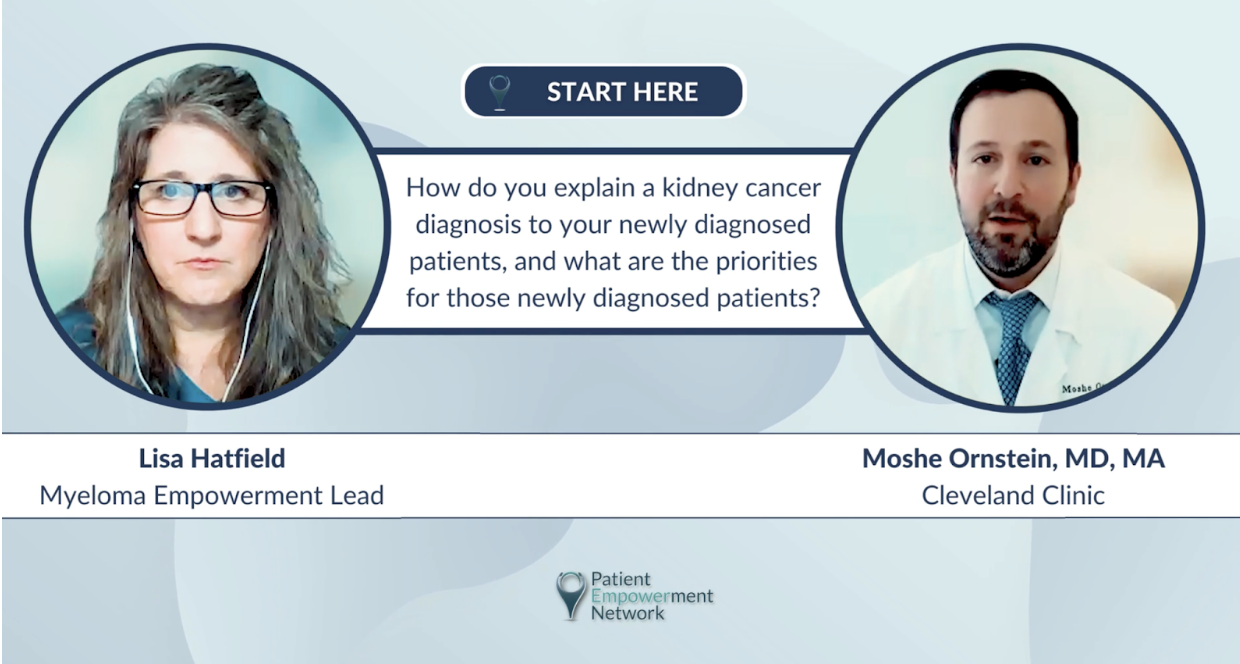
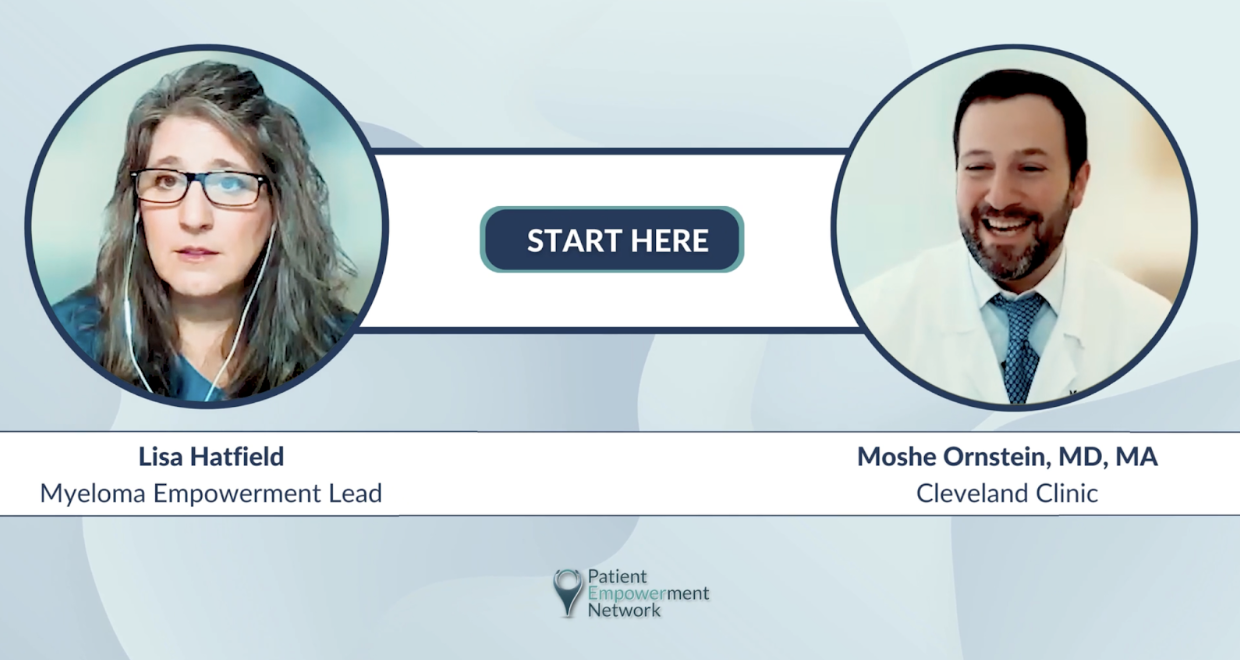





![RMC [ACT]IVATED Tip](https://powerfulpatients.org/wp-content/uploads/Screenshot-2023-06-21-at-11.20.10-AM-1030x550.png)
![RMC [ACT]IVATED Tip 2](https://powerfulpatients.org/wp-content/uploads/Screenshot-2023-06-21-at-11.21.35-AM-1030x578.png)
![RMC [ACT]IVATED Tip 3](https://powerfulpatients.org/wp-content/uploads/Screenshot-2023-06-21-at-11.22.56-AM-1030x586.png)
